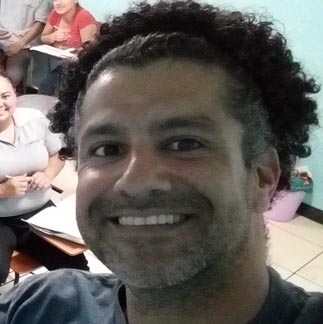Staying Put in Costa Rica During the Coronavirus Pandemic
Written By: Orlando Tillero | Updated: June 29, 2023
Written By: Orlando Tillero
Updated: June 29, 2023

My journey started in August 2019 when I was accepted to be part of a volunteer program in Costa Rica. Since I had no previous teaching experience, I considered this a great opportunity to test the waters. After I completed my 4-month contract with the program, I returned to US to spend the holidays with my family and check the job market to see where I wanted to go next.
Soon after, I was presented with an offer to go back to Costa Rica and work for the same organization, this time in a paid position as Teacher Coordinator. One of my main responsibilities in this role would be to travel to different locations all over the country for the finals round of student testing. I accepted the offer.

When COVID-19 hit Costa Rica, one of our main priorities was the well being of our volunteers, therefore we had to act fast. We had to cancel classes since it was ordered by the government, then we had to work together to make sure that our remaining volunteers returned to their home countries ASAP as they were shutting down borders all around the world.
I decided to remain in Costa Rica throughout this Coronavirus pandemic for two reasons:
- By the time we were done with all the temporary logistics of the program, being at airports or flying, for that matter, was not a safe option.
- With how quickly the virus is spreading throughout the US, being there was no longer a safe choice.
 Luckily, we were at the last stage of the program, final testing, so for the last two weeks we had to review materials for the final exam. Since we were no longer operating, we put together a review booklet for the students to complete and then we had to switch hats and become online teachers ourselves (we have some certified teachers working in other positions) and assist students with any questions they had about the review material. Before the pandemic, our regular classes would take place at brick and mortar locations, therefore we didn't have an online platform already in place. We had to improvise and use all tools available to us (Whatsapp, Google Hangouts, email, etc).
Luckily, we were at the last stage of the program, final testing, so for the last two weeks we had to review materials for the final exam. Since we were no longer operating, we put together a review booklet for the students to complete and then we had to switch hats and become online teachers ourselves (we have some certified teachers working in other positions) and assist students with any questions they had about the review material. Before the pandemic, our regular classes would take place at brick and mortar locations, therefore we didn't have an online platform already in place. We had to improvise and use all tools available to us (Whatsapp, Google Hangouts, email, etc).
Costa Rica is taking all the necessary actions in order to control this pandemic. Vehicular restrictions are going into effect this week, beaches have been closed to the public, some districts are no longer selling alcohol, bus schedules have been minimized, and all tourist attractions are not operating at the moment. In addition to these measures, people who are not nationals or residents of Costa Rica cannot enter or re-enter the country until further advised.
I'm doing my part to flatten the curve by staying at home as much as possible. We were ordered to work remotely so part of my day is dedicated to attending to the students needs online with whatever questions they may have, as well as taking breaks to check in with my family in the US to make sure they are all OK.
For more comprehensive information regarding your TEFL options during COVID-19, please read Coronavirus FAQs: TEFL & Teaching English Abroad or Online - What Are My Options?
Watching a video more your style? It's OK, we've got you covered! Check out our video addressing the issue below:
Posted In: Teach English in Latin America, Teach English in Costa Rica, Diversity Abroad, Teaching Abroad Over 40, Coronavirus
Orlando Tillero
Orlando is an adventurous traveler born in Venezuela but raised in the USA. He obtained his TEFL certification through International TEFL Academy a year ago and since then, traveling abroad has become almost a lifestyle for him. Orlando is currently living in Costa Rica and working as Teacher Coordinator for ALIARSE, an organization dedicated to providing English instruction to the vulnerable population in rural areas. He is always in search of a new adventure that can leave him with great experiences and new knowledge.
Want to Learn More About Teaching English Abroad & Online?
Request a free brochure or call 773-634-9900 to speak with an expert advisor about all aspects of TEFL certification and teaching English abroad or online, including the hiring process, salaries, visas, TEFL class options, job placement assistance and more.








